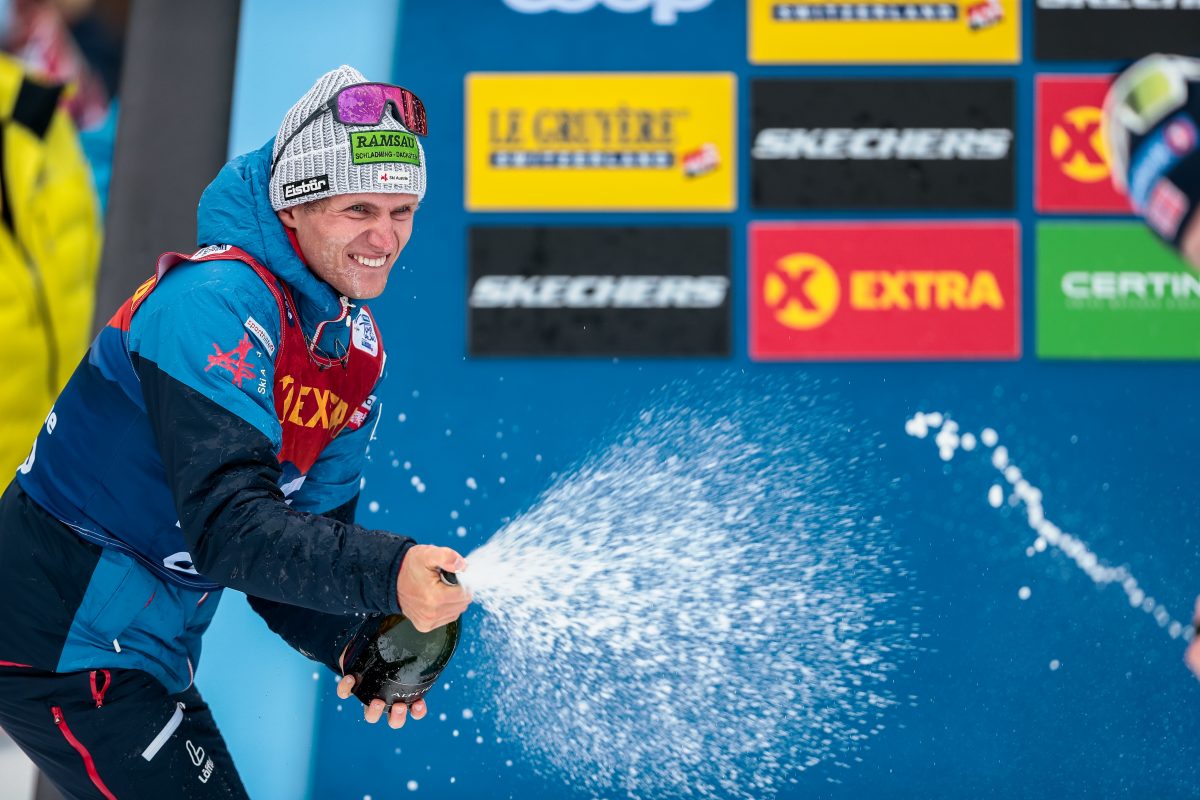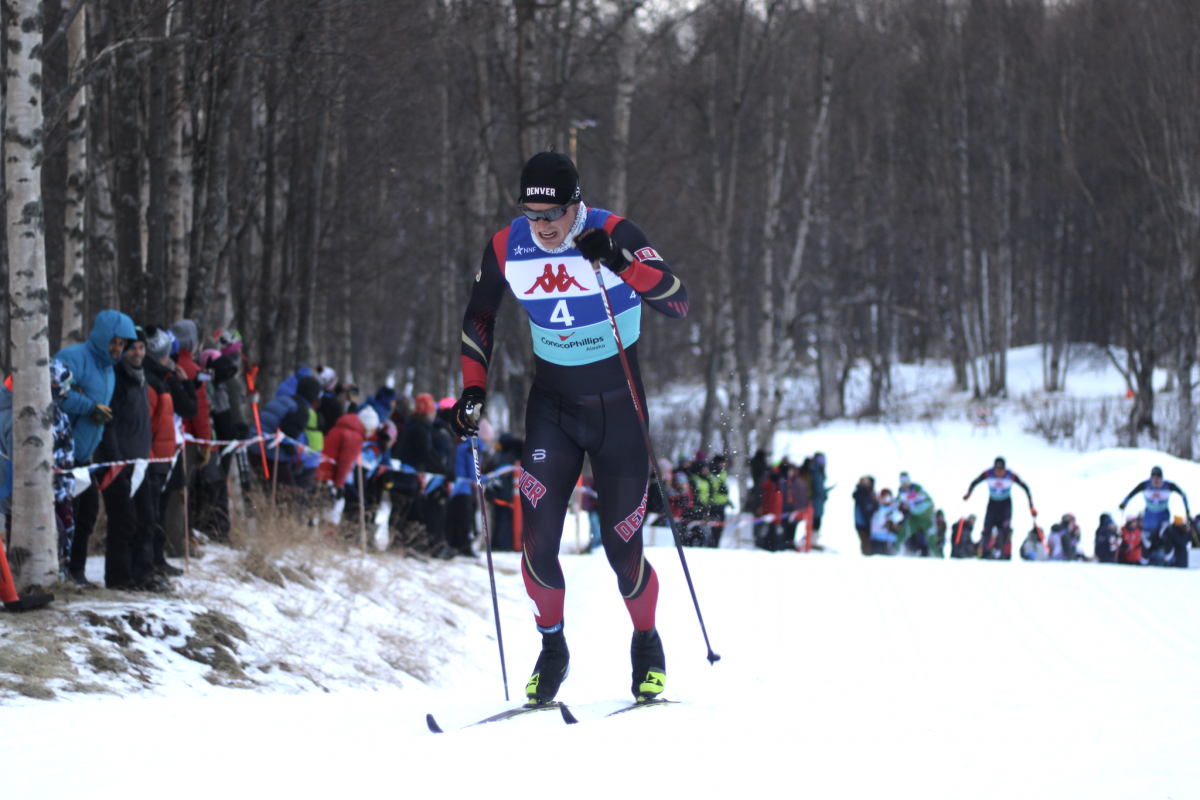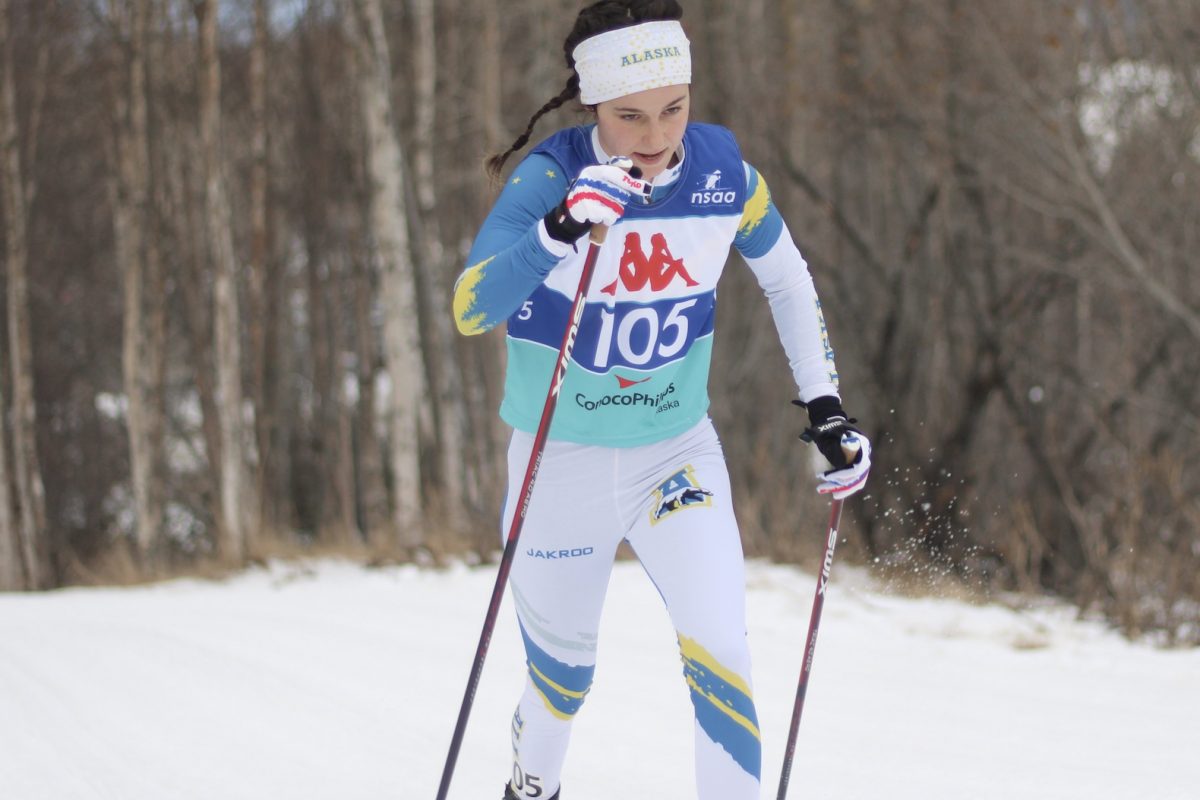
The second weekend of EISA racing was hosted by the University of New Hampshire (UNH) at the Jackson Touring Center. Friday held classic sprints and Saturday held 15 and 20 k mass start skate races.
Dartmouth won the weekend’s team scores over UVM by grabbing all four individual titles and an impressive nine out of the twelve podium spots, though UVM snagged the remaining three.
Heavy precipitation on Thursday night dumped snow onto a very thin racing course, and then proceeded into the warming morning hours with bails of sleet, rain, and “wintry mix”. The choice of kick was mixed as well, as racers tried various hard wax, klister and no-wax ski combinations. The 1.4k course was complete with a steeply stair-stepping 22 meter climb, which was the deciding factor in the majority of the field opting to use classic skis, despite the difficulty in getting both maximum glide over the flat stadium and enough grip to kick the ascent. Race winner Sam Tarling was one of just two or three racers on skate skis.
Tarling explained that he had made the ski decision the night before.
“It’s definitely really choppy out there and it’s a long, flat finish so I wanted to have speed coming into the finish, and really the hill is in stages and it’s not that big and you get to the top and you’re not even halfway done with the course, so you have a long downhill to catch up to people and hopefully be close enough to double pole by them in the end.”
And that is exactly what Tarling did.
The Dartmouth junior had no trouble powering through the stadium and split-running the hill in order to take the win in a six man final which saw racers on all three choices of no-wax, klister, and skate skis.

“I knew I wasn’t going to be first on the uphill, so I wanted to stay close and hopefully it would play out from there as it did in the quarters and the semis,” said Tarling, “but it was a little trickier because it was the final and everybody was really fast so it was harder than the other heats, definitely, and I had to do a lot of cat and mouse games with the guys and try to get free a little bit.”
There was a loud cheer from Harvard spectators who stood in the stadium as the first skier to shoot out of the woods and into the final ½ kilometer was Harvard sophomore Chris Stock.

“Yeah, Chris had a good climb and he had great skis, I think,” said Tarling, “but skate skis are just so much faster than classic skis and I was able to catch up. I managed to get free right after we came out of the woods, and I never looked back after that.”
In several powerful pole strokes Tarling was up and over the last rolling mound, past Stock and into the clear, poling down the finishing stretch with space to spare. Skyler Davis, entering the race as a guest and racing for the US Ski Team finished in second and Tarling’s teammates Eric Packer and Gordon Vermeer took third and fourth in order to stack the college podium for Dartmouth. Stock finished fifth and Alex Howe of UVM placed sixth.
The women’s final saw two full scoring teams UVM and Dartmouth racers toe the line, but though the field was strong, the victory was clear. Dartmouth senior Sophie Caldwell, who had easily cruised through her quarter and semifinal heats, did not mess around when it came down to the women’s “A” final. Said Caldwell, “I went all-out the whole way.”
As the prologue leader, Caldwell raced on zeros which she said worked great, but the changing track conditions made her switch to klister skis for the final heats. When those proved slow due to the increasing moisture in the track, rills were added to the ski structure for the final round.
“I didn’t actually execute the plan that I had”, said Caldwell of the final. “I wanted to just hop in behind someone and follow up the hill, but I ended up in the lead so I just decided to go really hard over the top and I guess that’s where I made a gap.”
Though she sprinted hard down the finishing stretch, Caldwell had already crushed her competitors and she crossed the line with 30 meters to spare. Caitlin Patterson of UVM finished in second and Annie Hart of Dartmouth came in third; Lucy Garrec (UVM )in fourth, Isabel Caldwell (DAR) in fifth, and Anja Gruber (UVM) in sixth.

After the sprint Caldwell was already looking forward to the next day’s races, explaining “The course here is so fun!”
The 5k lap course at the Jackson Touring Center is indeed quite remarkable for its corners and climbs, quick transitions, negotiations of S-turns, and a series of humps in which racers can actually get air time.

And those turns and dips get even more exciting when put into a mass start race format. Caldwell maintained that even the lead pack was extra careful through the scraped down ice and heaped up burms of the downhill turns, and she did not witness any crashes or falls in the group. After the first lap around, the lead pack mirrored the sprint finals in that it consisted almost entirely of Dartmouth and UVM racers, the one “outsider” being Elizabeth Guiney of UNH.
After the second lap the lead pack paired down to six racers, and Caldwell took turns at the front with teammates Erika Flowers and Annie Hart as they raced UVM competitors Caitlin Patterson, Amy Glen, and Lucy Garrec.
Flying into the field after their final lap, it was Caldwell and Patterson in a race for the line. Last weekend in Rumford it was Patterson who beat Caldwell in both races. This time Caldwell evened up the score, outsprinting Patterson to the line by one second to notch a two-title weekend.
Flowers and Glen finished third and fourth, while Garrec finished fifth and Hart was sixth.

The men’s mass start was no less exciting, with four men coming out of the woods toward a sprint finish. The victor was Dartmouth senior Eric Packer, a racer who has become quite used to the podium over the last three years. Joining him in the lead pack was teammate Sam Tarling, UVM’s Franz Bernstein, and Middlebury’s Patrick Johnson.
Packer lined out the bones of the four-lap race.
“I led a majority of the first lap until the downhill. At that point, Franz took over for awhile and then Patrick Johnson made a really decisive move and put the hammer down at the beginning of the second lap and basically kept that going for two whole laps. I think he wanted to make sure it didn’t come down to a sprint finish — and we were all just kind of hanging on. And then the last lap it switched around between Franz, Sam, and Patrick, and I was actually dangling about 20 meters behind them.”
Normally, a racer does all he can to maintain constant contact with the racer ahead of him, but Packer explained his strategy for hanging slightly off the back.

“The trails were so tight and turny that I noticed that skiing close together people were really tangling with each other a lot so I tried to ski my own race and just ski in the back and just give them room, and that ended up working well.”
And then the four racers exited the woods together into the final stretch of stadium. Bernstein thought that his competitors were evenly matched until the final burst of speed.
“It was fun until the end, and each of us could have won. . I kind of slingshot off Sam Tarling’s back and Eric did the same to me and got me by a ski length.”
Tarling crossed the line 1.3 seconds after Bernstein for third, with Johnson finishing just two seconds later in fourth.
This is Bernstein’s third time on the podium in four races and he has yet to win a race, but he was unperturbed by this fact. Bernstein spoke of the race loss to Packer by saying “I mean, he is a super good sprinter so I’m not really worried about it.”
Bernstein continued, “I felt fantastic about the skiing. I had such a good time today, the course is so much fun: all those tight turns and downhills, and fast conditions. I love that. It was fun ‘til the end.”
Meanwhile Packer was pleased with his second win of the season.
“It feels really good,” said Packer. “Today’s race went really well. It was nice and fast out there, really good conditions and better than I expected given the rain last night, so it was a really good race.”






